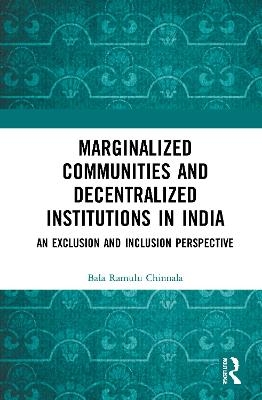
Marginalized Communities and Decentralized Institutions in India
Routledge India (Verlag)
978-1-138-60748-4 (ISBN)
This book examines the causes and consequences of marginalization of social groups and the state of democratic decentralization in India in the unfolding context of globalization and changing perspectives of development models and institutions. The first of its kind, it correlates macro-and micro-level issues to understand social exclusion and inclusion and the level of participation of democratic institutions at the grassroots level since economic liberalization (1991) and the 73rd Constitution Amendment Act of 1992, marking three decades since granting constitutional status to the Panchayati Raj Institutions.
The study looks at the linkages between certain key themes: the neoliberal model of development, growth, and distributive justice; the role and mandate of grassroots-level public institutions enshrined in the Constitution, inclusive growth, and the Indian State; the role of political executives from marginalized communities; factors involved in people’s active participation in the development process; and challenges in current political structures, inclusion of marginalized communities in governance and development, and real empowerment of local bodies and institutions. The book argues that legislative enactments, constitutional status, reservation of seats to marginalized communities, and so on can only empower local bodies and their leadership symbolically. The success of these provisions depends on the overall development model of the country; the support of national and state governments; the socio-economic and political environment of the institutions; and effective service and accountability.
Topical and rich in empirical data, including case studies, this book will be an essential read for scholars and researchers of political science, development studies, governance, public administration, sociology, public policy, and also for government agencies, administrators and bureaucrats, policymakers, international organizations, think tanks, and NGOs working in the area.
Bala Ramulu Chinnala is Visiting Professor at the Centre for Economic and Social Studies, Hyderabad, Telangana, India. He was Emeritus Fellow, University Grants Commission, New Delhi and National Fellow, Indian Council of Social Science Research, New Delhi. Earlier he was Professor of Public Administration at Kakatiya University (1975 to 2010) and served in various academic and administrative capacities. A recipient of several awards, he has also held a number of visiting fellowships. He has published six books and 60 research papers in journals. His books include Governance of Food Security Policies in India (2016); Technology and Rural Development (2000); International Organizations and Rural Employment Programs in India: Emerging Trends (1999); Development Strategies in India: Emerging Trends (coedited, 1993); Public Policies: An Evaluation of Integrated Rural Development Programme (1991); and Administration on Anti-Poverty Programme (A Study of SFDA) (1984). His teaching and research interests are in the areas of development studies, decentralized governance, rural livelihood, and public policy analysis.
1. Introduction 2. Development Models, Decentralization and Position of Marginalized Communities in India 3. Marginalized Communities and Decentralization in a South Indian State 4. Exclusion and Inclusion in Decentralized Institutions 5. Profiles of the Political Executives 6. Conclusion
| Erscheinungsdatum | 15.01.2021 |
|---|---|
| Zusatzinfo | 1 Tables, black and white |
| Verlagsort | London |
| Sprache | englisch |
| Maße | 156 x 234 mm |
| Gewicht | 367 g |
| Themenwelt | Naturwissenschaften ► Geowissenschaften ► Geografie / Kartografie |
| Sozialwissenschaften ► Politik / Verwaltung | |
| Sozialwissenschaften ► Soziologie ► Spezielle Soziologien | |
| ISBN-10 | 1-138-60748-7 / 1138607487 |
| ISBN-13 | 978-1-138-60748-4 / 9781138607484 |
| Zustand | Neuware |
| Haben Sie eine Frage zum Produkt? |
aus dem Bereich


